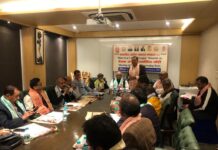
“Shaheedon ko de do Shradhanjali, China ke Samano ko do Tilanjali” – Jaipur Youth Population.
Local activists from Jaipur came down hard on Chinese manufacturers, in response to a series of derogatory comments published by Global Times, a Chinese newspaper. Since Beijing decided to play Pakistan’s bodyguard, Indian youths have been requesting the locales via various social networks to boycott Chinese goods.
An infuriated Chinese media criticized Indians for their lazy attitude and weak manufacturing units. Quoting a famous axiom, “Barking dogs seldom bite“, the media personnel claimed,
“Indians are lazy and loud mouthed. They can just say but, don’t have to the guts to act. We’re confident that Indians will continue buying Chinese products, as they’re clearly better and more reliable than Indian goods”.
The ‘game-changing’ statement has certainly turned the tables for Chinese distributors now. Deeply agitated by China’s “sneaky” attitude with respect to Indo-Pak tension, many local activists in Jaipur hit the streets, demanding the public to boycott Chinese products on Diwali. Consequently, the sale of festive items like lights, portraits, idols and decorations has dropped by 40%. Aggravated Rajasthan natives have started preferring India-made products over Chinese goods.
Chinese Goods Sale Declines in Jaipur
Shyam Meena, a dealer in Chinese lights had ordered decorations worth Rs. 10 lakhs last year. The sale was good because Chinese items were easily available at cheaper prices. Compared to last year, he didn’t order that many goods this year, seeing the hostile attitude of buyers towards China.
To add to this, the demand of electronic items including mobile phones and LCDs declined by 2% and 10% respectively, as reported by Suresh Agarwal, President, FORTI (Federation of Rajasthan Trade and Industry). The body has been conducting an internal survey on sale and purchase of Chinese products in the local markets, since past couple of weeks. The survey reports reveal a ‘Massive decline in overall sale of Chinese products by 30 to 40%’.
Youth Played a Significant Role in This Revolution
At times, it’s difficult to identify China-made products as manufactures replicate Indian designs and detailing to utmost perfection. Nevertheless, youngsters like Sandeep Gupta, a CA by profession but social activist by hobby, run public campaigns to create awareness in the market. Gupta spares a few hours from his busy schedule to patrol local markets every day.
“The young generation is aware on this issue”, he said. The impact of active campaigning will be visible, once the sale of electronic goods comes down. Bhaskar Gupta, an engineering student expressed his angst against China saying,
“Why should we buy Chinese products, a friend of Pakistan? We will buy Desi things”.
If the trend continues, the Chinese may suffer tremendous losses in future. It’s a happy news for domestic brands like Patanjali that favour ‘Swadeshi’ ideas. It’s a silent plea to the Government for reinforcing the paralyzed manufacturing units in India.







